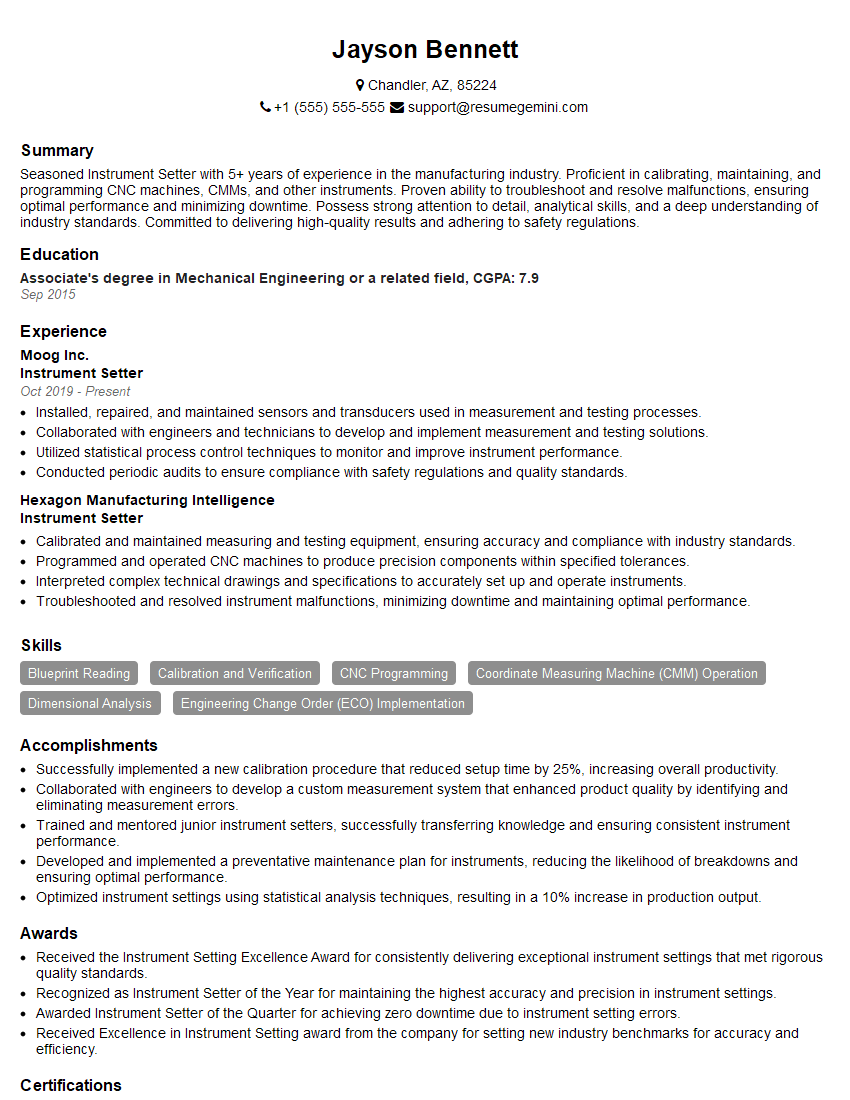Are you a seasoned Instrument Setter seeking a new career path? Discover our professionally built Instrument Setter Resume Template. This time-saving tool provides a solid foundation for your job search. Simply click “Edit Resume” to customize it with your unique experiences and achievements. Customize fonts and colors to match your personal style and increase your chances of landing your dream job. Explore more Resume Templates for additional options.

Jayson Bennett
Instrument Setter
Summary
Seasoned Instrument Setter with 5+ years of experience in the manufacturing industry. Proficient in calibrating, maintaining, and programming CNC machines, CMMs, and other instruments. Proven ability to troubleshoot and resolve malfunctions, ensuring optimal performance and minimizing downtime. Possess strong attention to detail, analytical skills, and a deep understanding of industry standards. Committed to delivering high-quality results and adhering to safety regulations.
Education
Associate’s degree in Mechanical Engineering or a related field
September 2015
Skills
- Blueprint Reading
- Calibration and Verification
- CNC Programming
- Coordinate Measuring Machine (CMM) Operation
- Dimensional Analysis
- Engineering Change Order (ECO) Implementation
Work Experience
Instrument Setter
- Installed, repaired, and maintained sensors and transducers used in measurement and testing processes.
- Collaborated with engineers and technicians to develop and implement measurement and testing solutions.
- Utilized statistical process control techniques to monitor and improve instrument performance.
- Conducted periodic audits to ensure compliance with safety regulations and quality standards.
Instrument Setter
- Calibrated and maintained measuring and testing equipment, ensuring accuracy and compliance with industry standards.
- Programmed and operated CNC machines to produce precision components within specified tolerances.
- Interpreted complex technical drawings and specifications to accurately set up and operate instruments.
- Troubleshooted and resolved instrument malfunctions, minimizing downtime and maintaining optimal performance.
Accomplishments
- Successfully implemented a new calibration procedure that reduced setup time by 25%, increasing overall productivity.
- Collaborated with engineers to develop a custom measurement system that enhanced product quality by identifying and eliminating measurement errors.
- Trained and mentored junior instrument setters, successfully transferring knowledge and ensuring consistent instrument performance.
- Developed and implemented a preventative maintenance plan for instruments, reducing the likelihood of breakdowns and ensuring optimal performance.
- Optimized instrument settings using statistical analysis techniques, resulting in a 10% increase in production output.
Awards
- Received the Instrument Setting Excellence Award for consistently delivering exceptional instrument settings that met rigorous quality standards.
- Recognized as Instrument Setter of the Year for maintaining the highest accuracy and precision in instrument settings.
- Awarded Instrument Setter of the Quarter for achieving zero downtime due to instrument setting errors.
- Received Excellence in Instrument Setting award from the company for setting new industry benchmarks for accuracy and efficiency.
Certificates
- ASQ Certified Quality Technician (CQT)
- Certified Manufacturing Technologist (CMfgT)
- Certified Measurement and Test Professional (CMTP)
- Certified Six Sigma Black Belt (CSSBB)
Career Expert Tips:
- Select the ideal resume template to showcase your professional experience effectively.
- Master the art of resume writing to highlight your unique qualifications and achievements.
- Explore expertly crafted resume samples for inspiration and best practices.
- Build your best resume for free this new year with ResumeGemini. Enjoy exclusive discounts on ATS optimized resume templates.
How To Write Resume For Instrument Setter
- Highlight your technical skills and experience in calibrating, programming, and operating instruments.
- Quantify your accomplishments whenever possible to demonstrate your impact on the organization.
- Tailor your resume to the specific requirements of each job you apply for.
- Proofread your resume carefully before submitting it to ensure there are no errors.
- Consider including a portfolio of your work to showcase your skills and experience.
Essential Experience Highlights for a Strong Instrument Setter Resume
- Calibrated and maintained measuring and testing equipment to ensure accuracy and compliance with industry standards.
- Programmed and operated CNC machines to produce precision components within specified tolerances.
- Interpreted complex technical drawings and specifications to accurately set up and operate instruments.
- Troubleshooted and resolved instrument malfunctions, minimizing downtime and maintaining optimal performance.
- Collaborated with engineers and technicians to develop and implement measurement and testing solutions.
- Utilized statistical process control techniques to monitor and improve instrument performance.
- Conducted periodic audits to ensure compliance with safety regulations and quality standards.
Frequently Asked Questions (FAQ’s) For Instrument Setter
What are the primary responsibilities of an Instrument Setter?
Instrument Setters are responsible for calibrating, maintaining, and programming instruments used in the manufacturing process. They also troubleshoot and resolve malfunctions, and collaborate with engineers and technicians to develop and implement measurement and testing solutions.
What are the educational requirements for becoming an Instrument Setter?
Most Instrument Setters have an associate’s degree in Mechanical Engineering or a related field.
What are the key skills and qualities for success as an Instrument Setter?
Successful Instrument Setters have strong attention to detail, analytical skills, and a deep understanding of industry standards. They are also proficient in using a variety of instruments and software.
What are the career prospects for Instrument Setters?
Instrument Setters can advance to positions such as Quality Control Inspector, Manufacturing Engineer, or Production Supervisor.
What is the average salary for an Instrument Setter?
The average salary for an Instrument Setter is around $25,000 per year.
What are the working conditions for Instrument Setters?
Instrument Setters typically work in a manufacturing environment. They may be required to work overtime or on weekends.